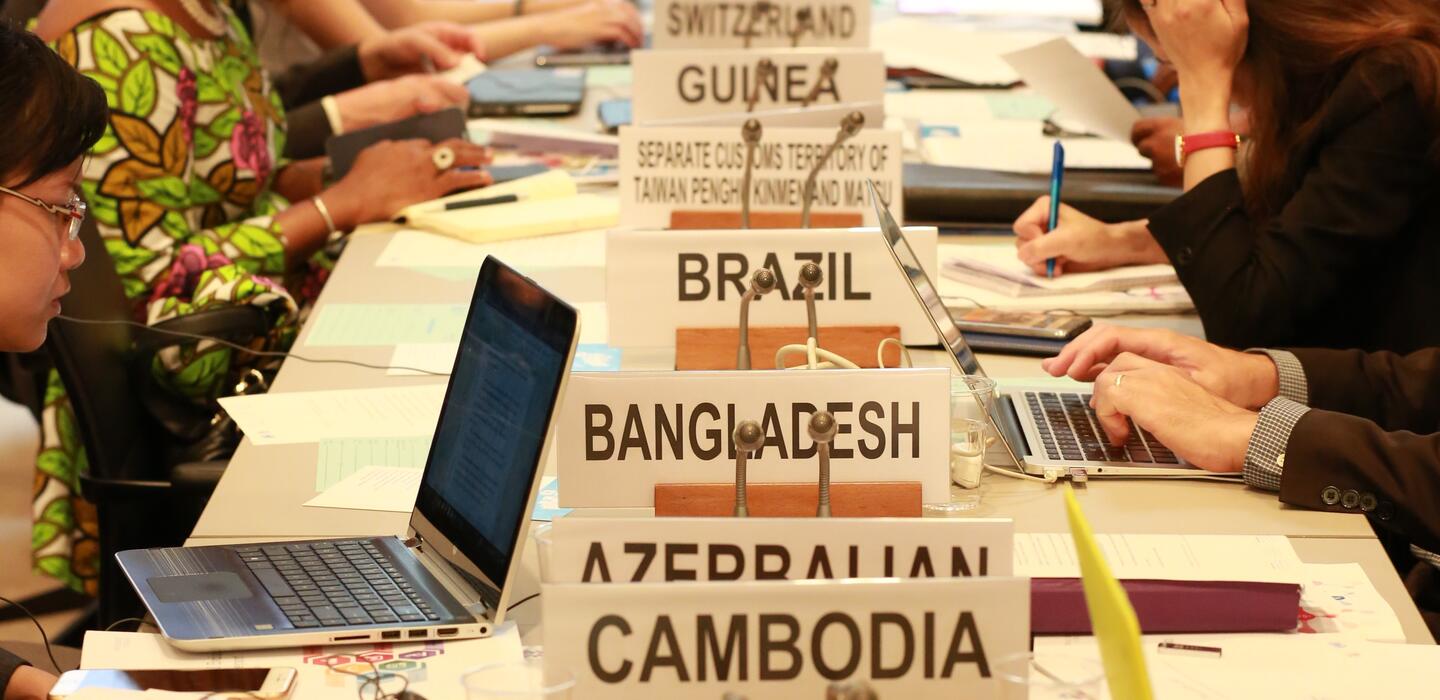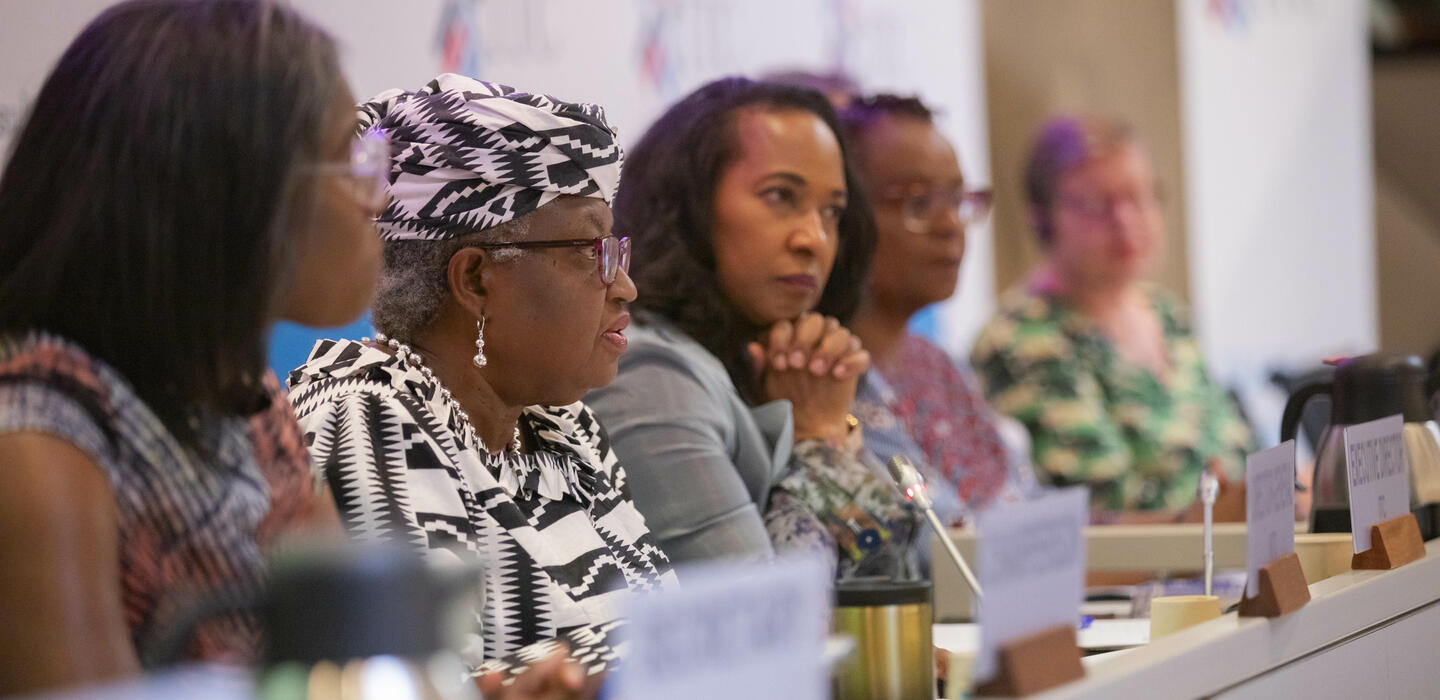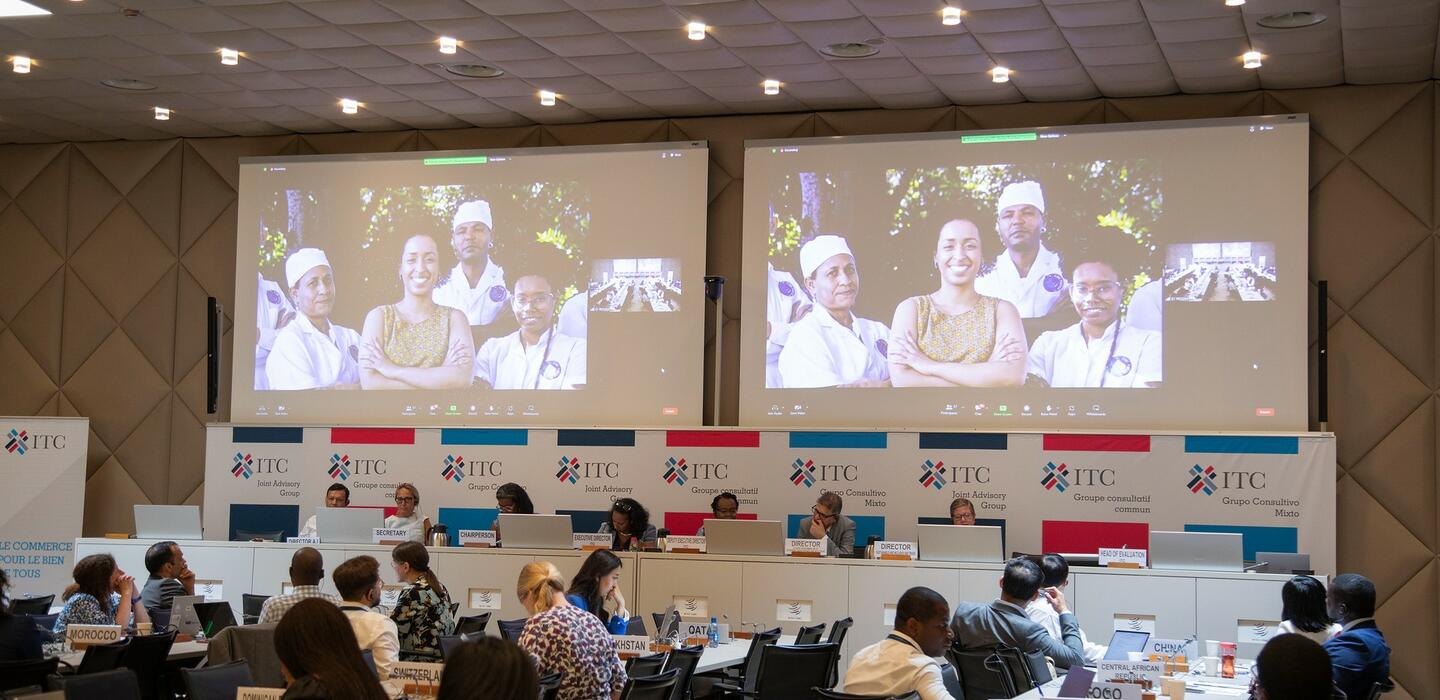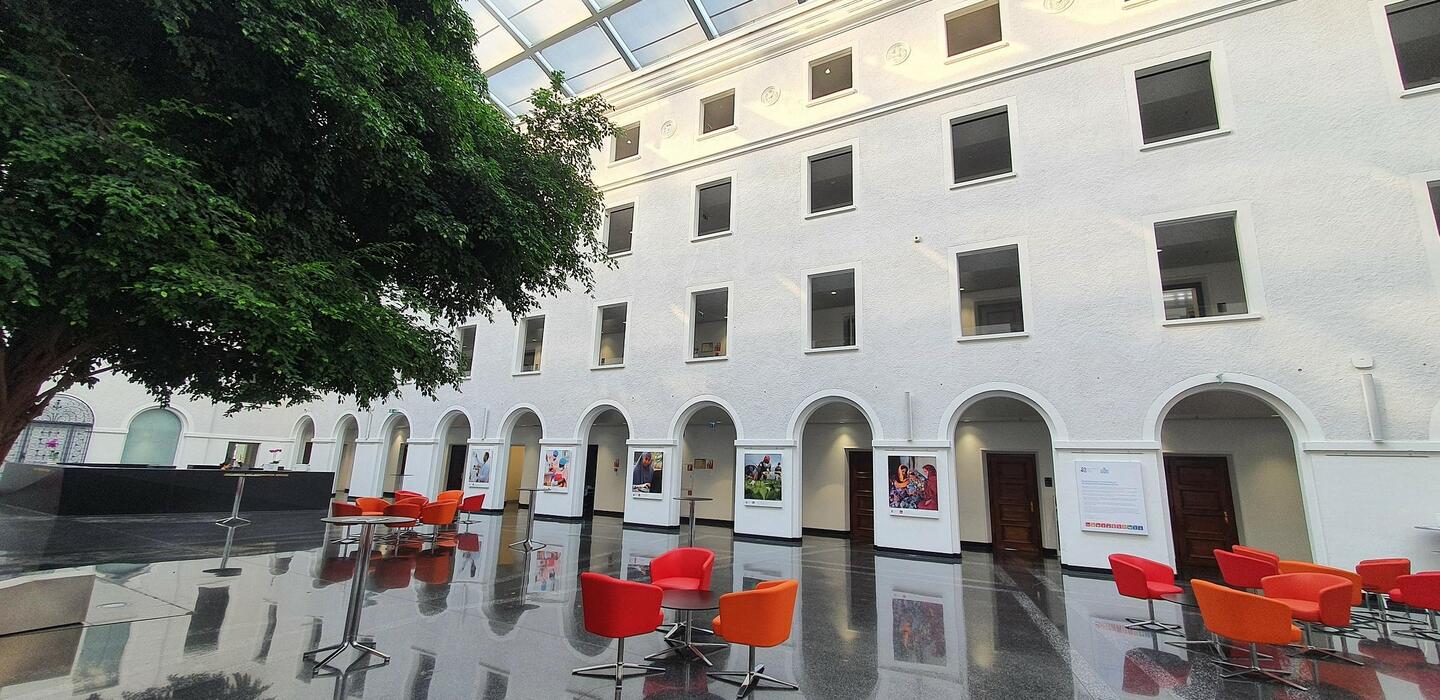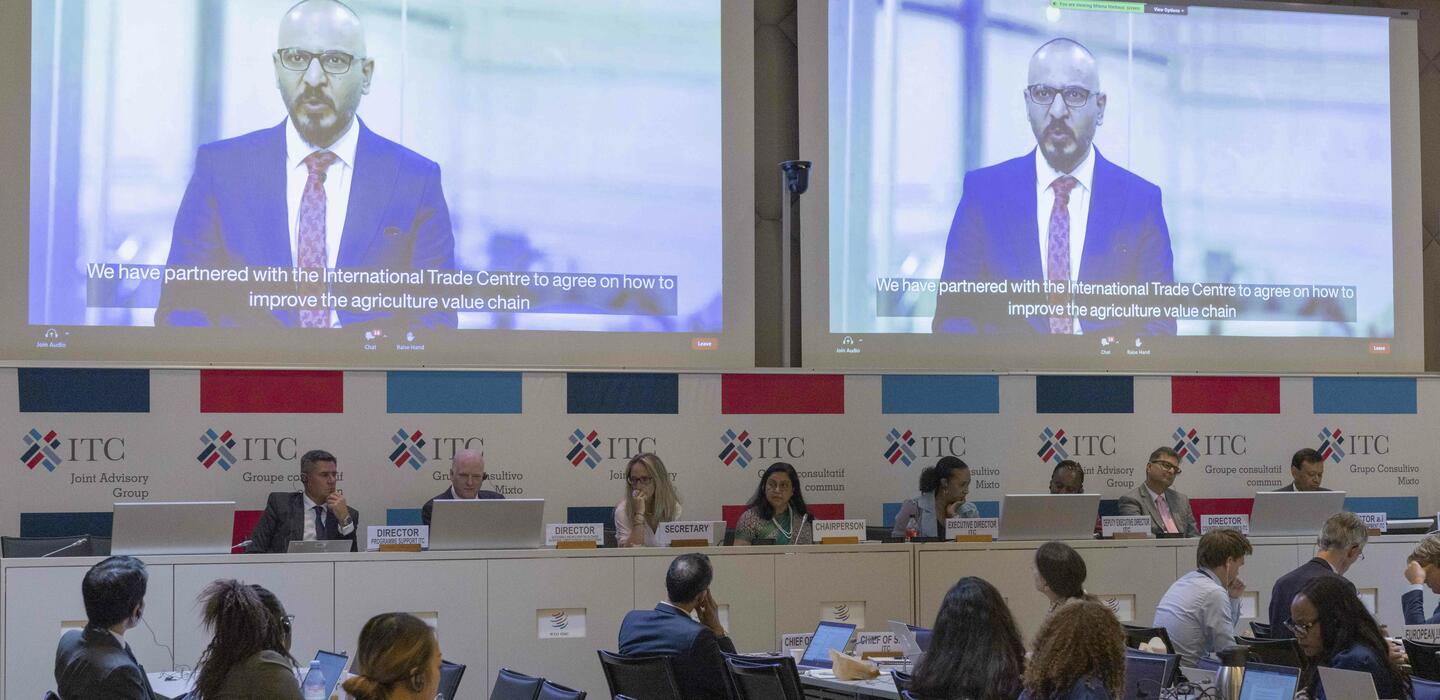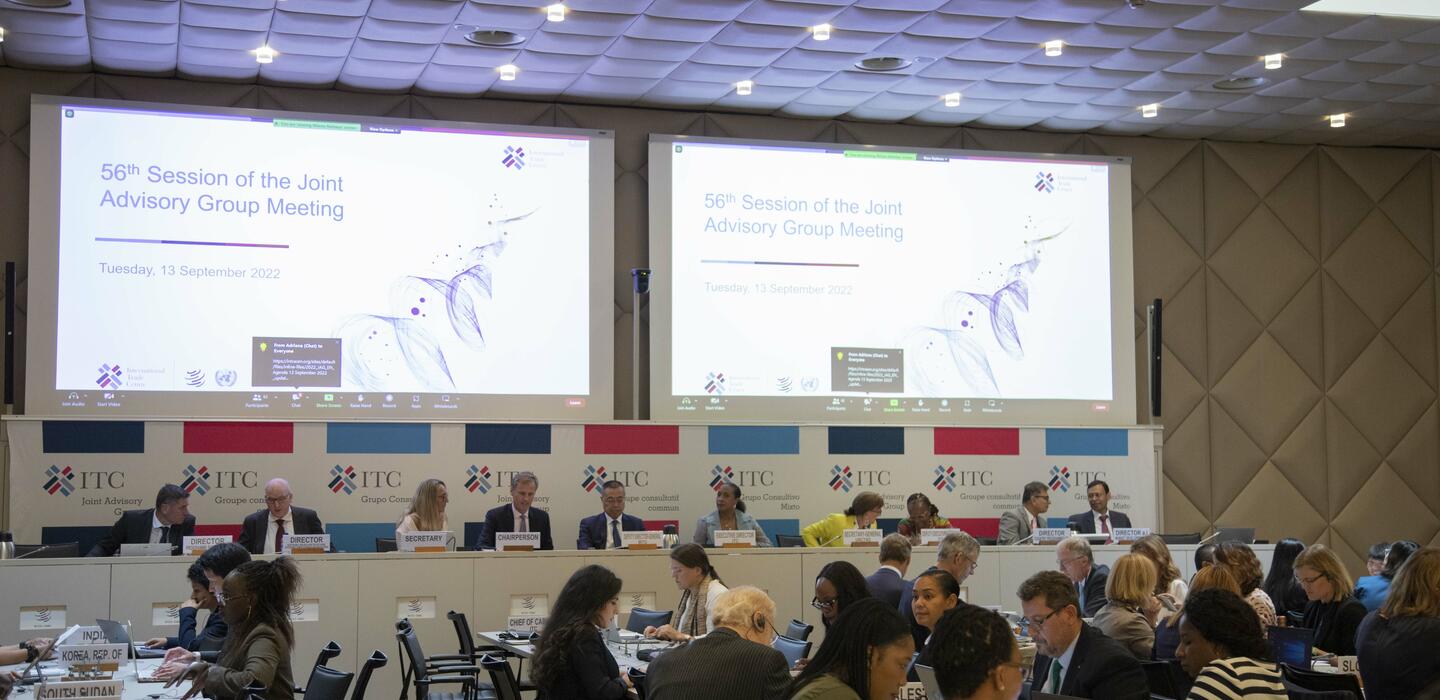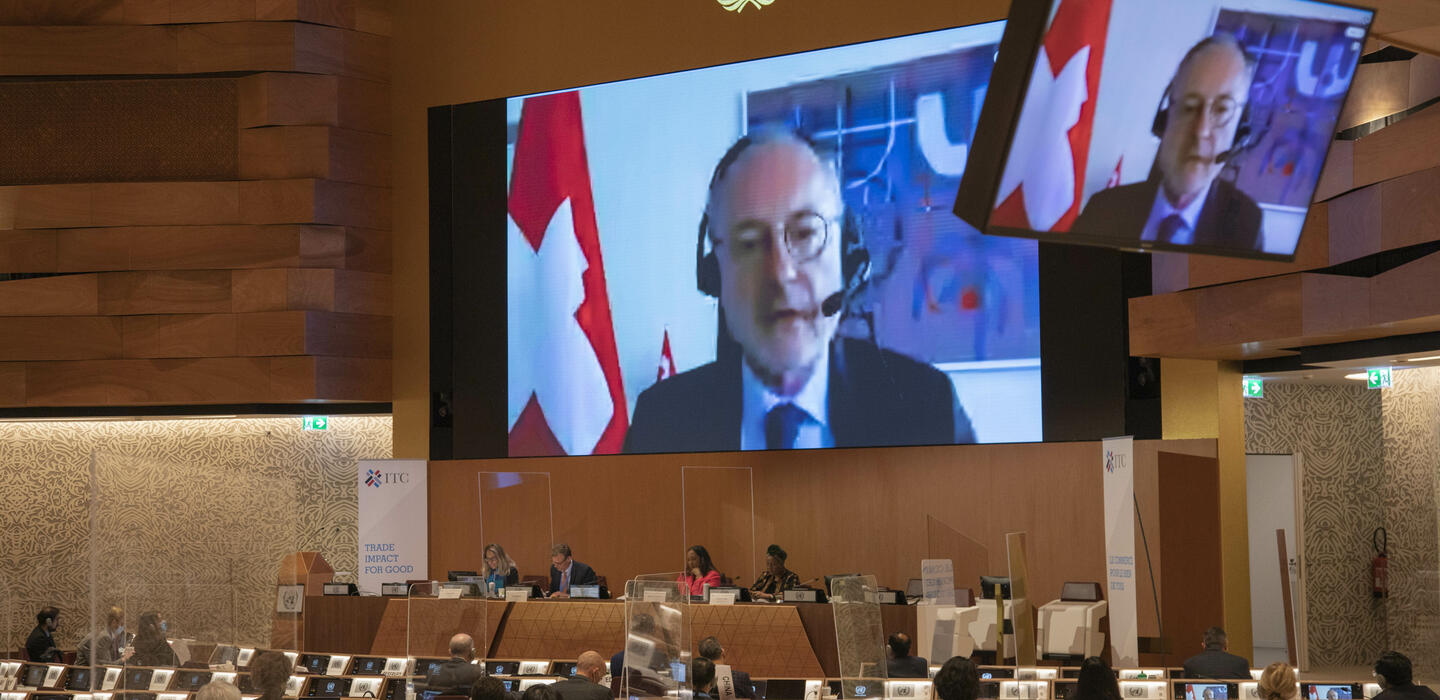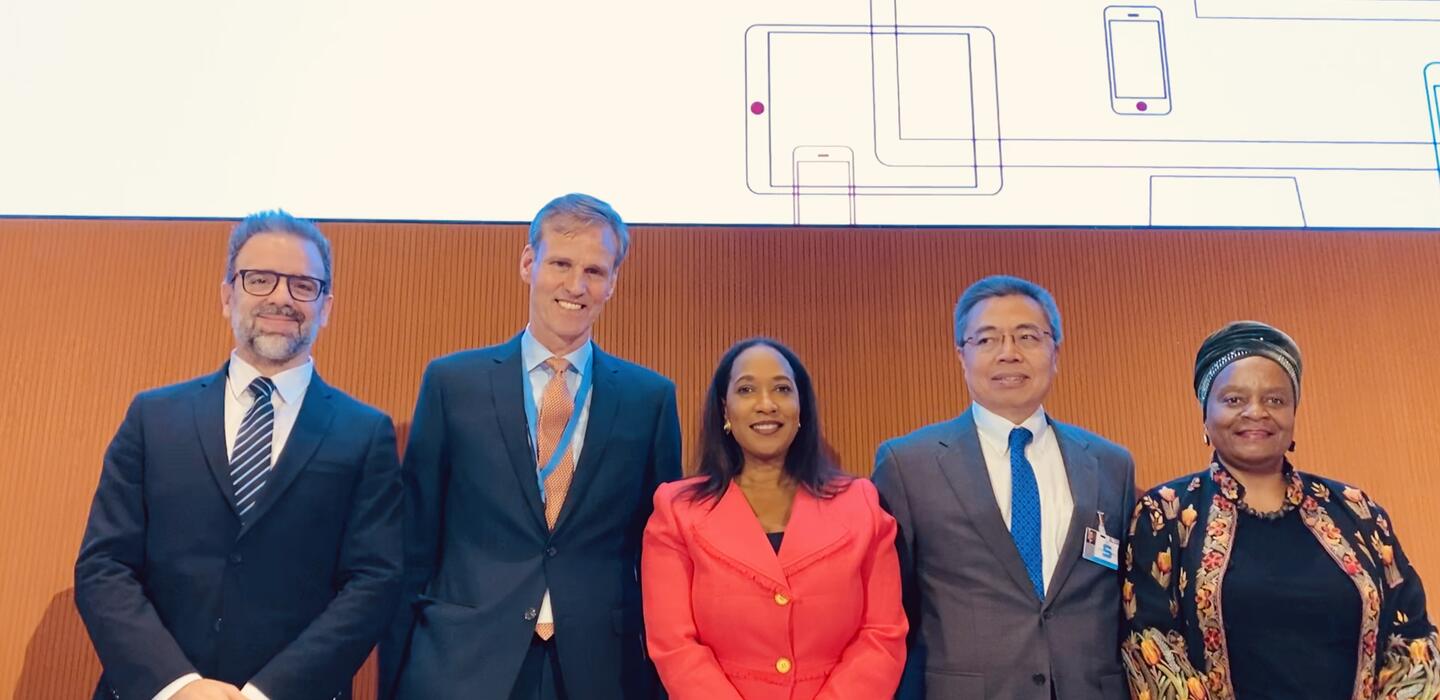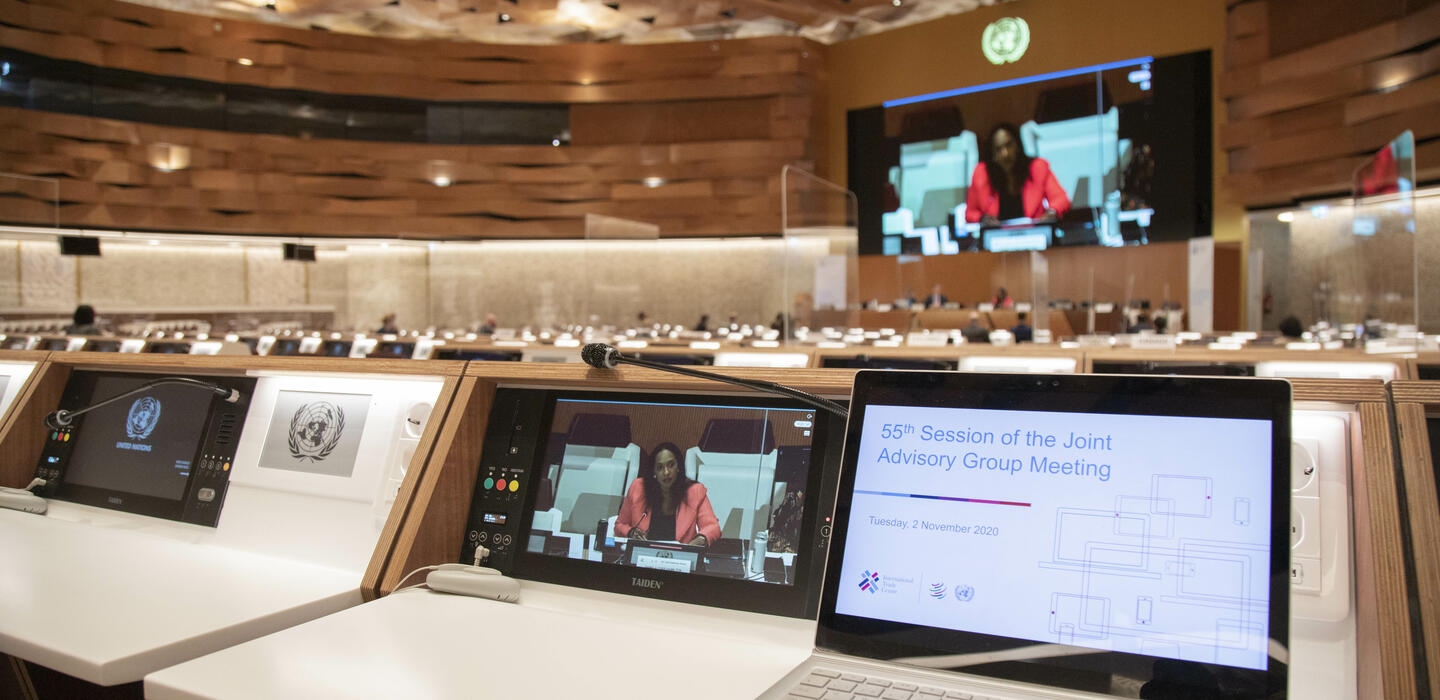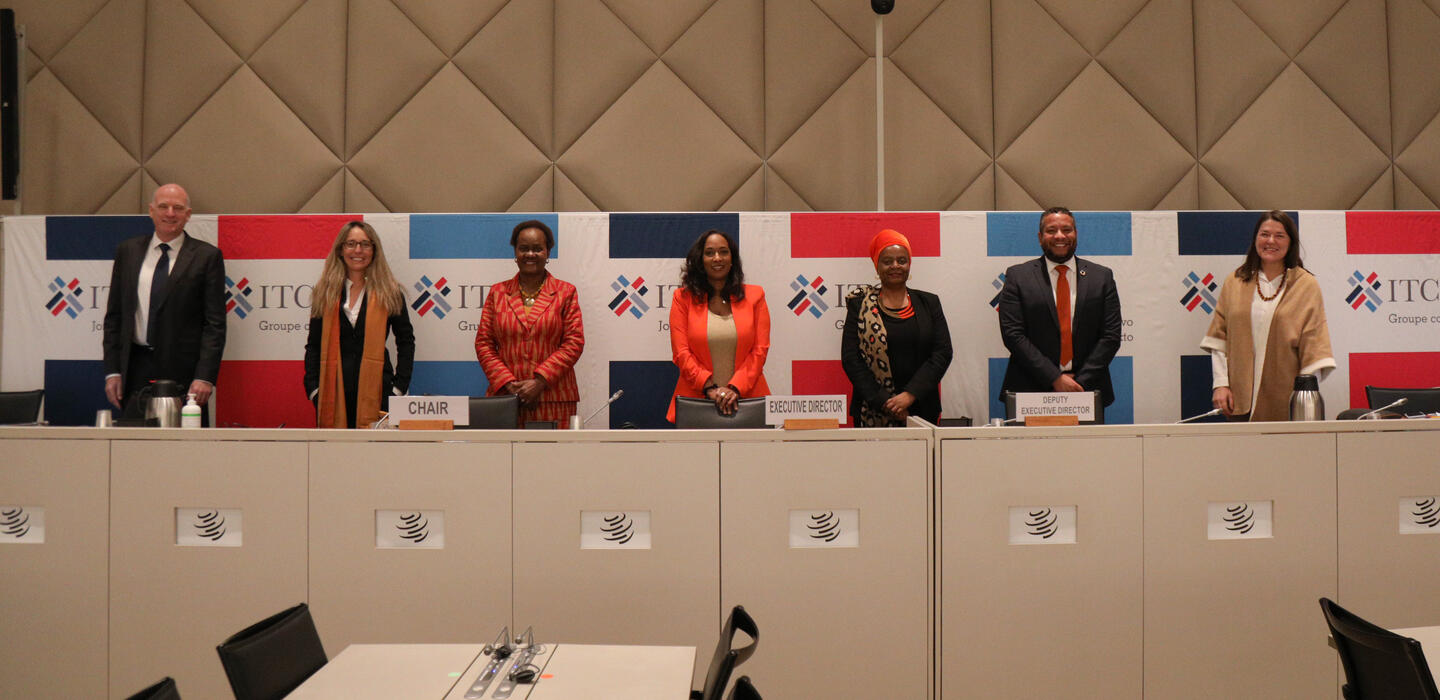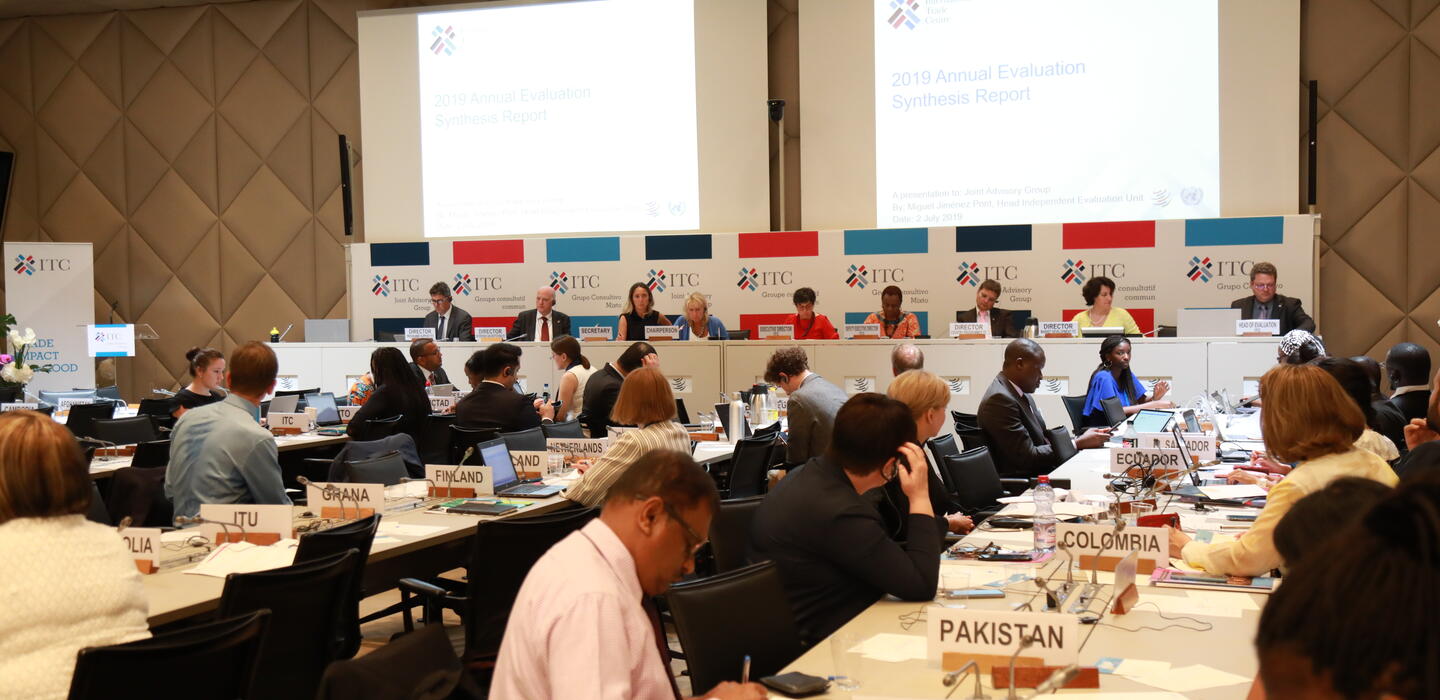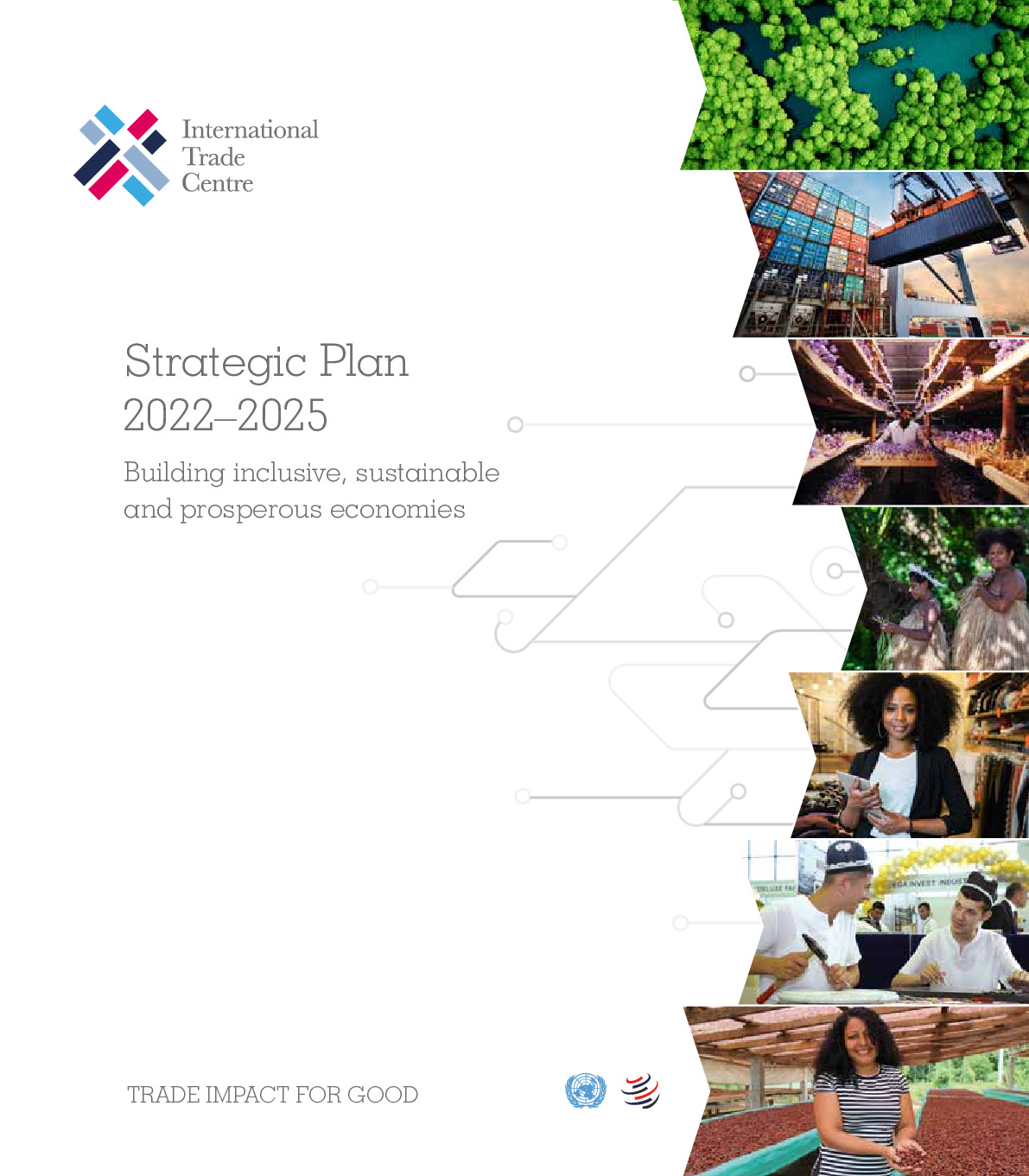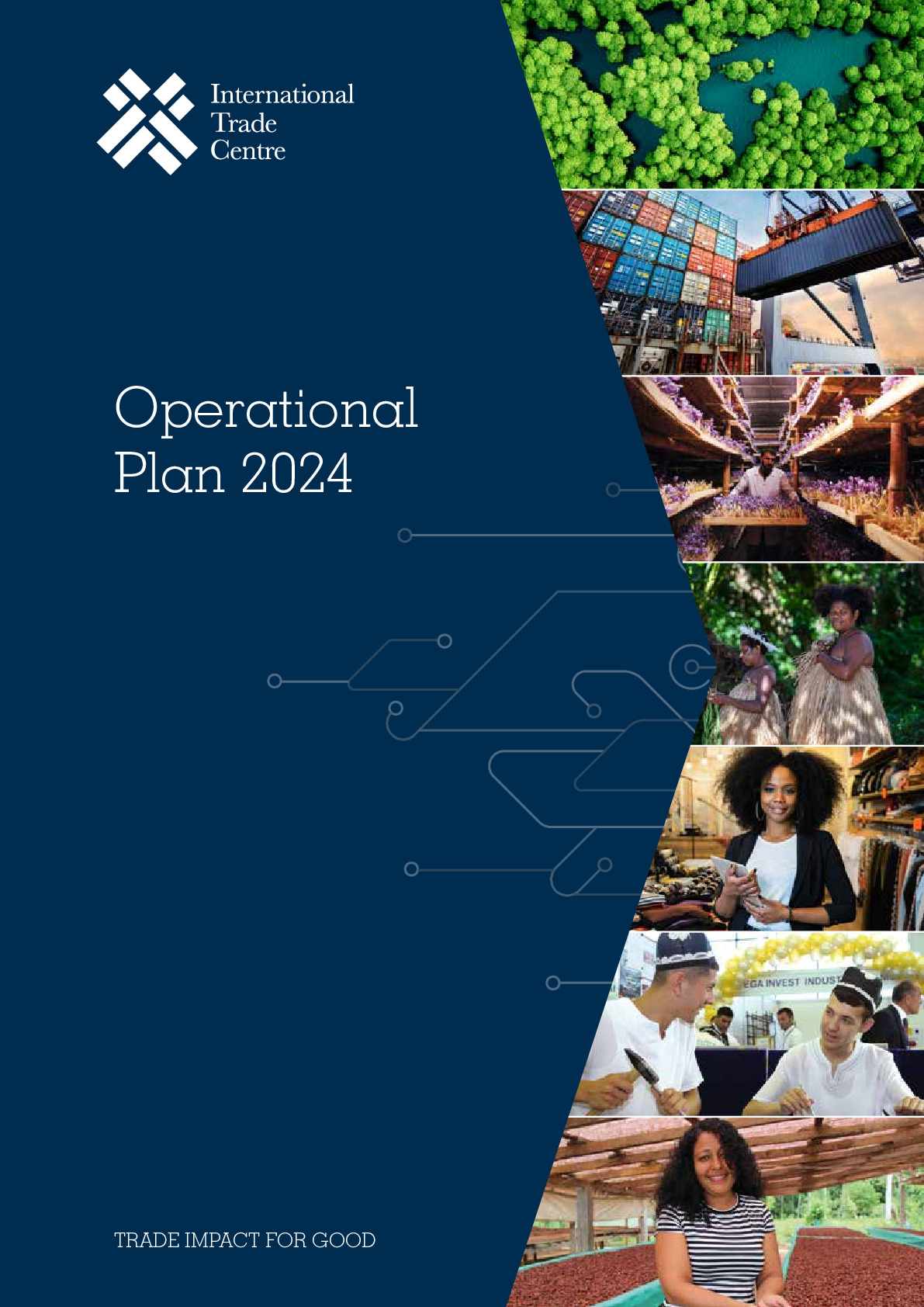The Joint Advisory Group (JAG)
The Joint Advisory Group (JAG) amplifies ITC’s dedication to keeping its work around the world both transparent and accountable.
After examining ITC’s activities, the JAG makes recommendations to the UNCTAD Trade and Development Board and to the Committee on Trade and Development of the World Trade Organization on ITC’s programme of work.
Governments of Member States of UNCTAD and members of the WTO are invited to this meeting. It is recommended that the representation be at the level of Ambassador or Senior Official.
The JAG meeting is open to United Nations specialized agencies and bodies, and to other intergovernmental organizations with observer status as well as to relevant non-governmental organizations.
Related documents
- Statement by the Chair of the 57th Session: H.E. Ms. Nadia Theodore, Ambassador, Permanent Representative to the WTO, Permanent Mission of Canada to the World Trade Organization in Geneva
- Statement by the Chair of the 58th Session: H.E. Ms. Hend Abdalrahman Al-Muftah, Ambassador, Permanent Representative to the WTO, Permanent Mission of the State of Qatar to the United Nations Office and other International Organizations at Geneva
- Statement by the WTO Director-General, Ms. Ngozi Okonjo-Iweala
- Statement by the UNCTAD Secretary-General, Ms. Rebeca Grynspan
- Statement by the ITC Executive Director, Ms. Pamela Coke-Hamilton
- Chair’s Report
- Executive Director’s closing remarks
- Antigua and Barbuda
- Benin
- Bhutan
- Brazil
- Cambodia
- Cameroon
- CARICOM
- Central African Republic
- China
- Côte d'Ivoire
- Dominican Republic
- Donor Coordinator (United States of America)
- Ecuador
- El Salvador
- European Union
- Guinea
- India
- Indonesia
- Iran (Islamic Republic of)
- Jamaica
- Japan
- Jordan
- Kazakhstan
- Lao People's Democratic Republic
- Malaysia
- Mauritius
- Mongolia
- Morocco
- Nepal
- Nigeria
- Pakistan
- Philippines
- Republic of Korea
- Senegal
- South Africa
- South Sudan
- Sri Lanka
- State of Palestine
- Sweden
- The Gambia
- Timor-Leste
- Togo
- Tunisia
- Uganda
- United Kingdom of Great Britain and Northern Ireland
- Uzbekistan
- Vanuatu
- Zambia
- Zimbabwe
JAG24 - Voices from ITC project beneficiaries and partners
Related documents
- 2023 JAG Report - English
- 2023 JAG Report - French
- 2023 JAG Report - Spanish
- 2023 JAG Report - Arabic
- 2023 JAG Report - Chinese
- 2023 JAG Report - Russian
- Agenda of the 122nd session of the Committee on Trade and Development (CTD)
https://twitter.com/ITCnews/status/1725472371237175414 - Agenda of the 74th executive session of the Trade and Development Board (TDB)
https://x.com/ITCnews/status/1727334835016867998?s=20
- Statement by the Chair of the 56th Session: H.E. Ms. Usha Chandnee Dwarka-Canabady, Ambassador, Permanent Representative to the WTO, Permanent Mission of the Republic of Mauritius to the United Nations Office at Geneva
- Statement by the Chair of the 57th Session: H.E. Ms. Nadia Theodore, Ambassador, Permanent Representative to the WTO, Permanent Mission of Canada to the World Trade Organization in Geneva
- Statement by the WTO Director-General, Ms. Ngozi Okonjo-Iweala
- Statement by the UNCTAD Secretary-General, Ms. Rebeca Grynspan
- Statement by the ITC Executive Director, Ms. Pamela Coke-Hamilton
- Chair’s Report
- Executive Director’s closing remarks
- Bhutan
- Cambodia
- CARICOM (Barbados)
- Central African Republic
- China
- Comoros
- Côte d'Ivoire
- Dominican Republic
- Donor Coordinator (Germany)
- Ecuador
- Ethiopia
- European Union
- Germany
- Guinea
- India
- Jamaica
- Japan
- Jordan
- Kazakhstan
- Kenya
- Republic of Korea
- Madagascar
- Malawi
- Malaysia
- Mauritius
- Republic of Moldova
- Mongolia
- Morocco
- Nepal
- Niger
- Pakistan
- Philippines
- Qatar
- Senegal
- Sierra Leone
- South Sudan
- Sri Lanka
- State of Palestine
- Sweden
- Tanzania
- Togo
- Tunisia
- Ukraine
- United Kingdom
- Viet Nam
- Zambia
JAG23 - Voices from ITC project beneficiaries and partners
Related documents
- 2022 JAG Report - English
- 2022 JAG Report - French
- 2022 JAG Report - Spanish
- 2022 JAG Report - Arabic
- 2022 JAG Report - Chinese
- 2022 JAG Report - Russian
- Agenda of the 119th session of the Committee on Trade and Development
- Agenda of the 73rd Executive Session of UNCTAD Trade and Development Board
- Statement by the Chair of the 55th Session: H.E. Mr. Paul Bekkers, Ambassador, Permanent Representative to the WTO, Permanent Mission of the Kingdom of the Netherlands to the United Nations Office and other International Organizations in Geneva
- Statement by the Chair of the 56th Session: H.E. Ms. Usha Chandnee Dwarka-Canabady, Ambassador, Permanent Representative to the WTO, Permanent Mission of the Republic of Mauritius to the United Nations Office at Geneva
- Statement by the WTO Deputy Director-General, Mr Xiangchen Zhang
- Statement by the UNCTAD Secretary-General, Ms. Rebeca Grynspan
- Statement by the ITC Executive Director, Ms. Pamela Coke-Hamilton
- Interventions from ITC project stakeholders:
- Doaa Aliewa and Mohammed Alazaiza, beneficiaries of “Go Digital Project”, State of Palestine
- Mariama Johm, CEO Afri Taste, SheTrades project, The Gambia
-
European Union
-
State of Palestine
-
United Republic of Tanzania
JAG22 - Voices from ITC project beneficiaries and partners
Related documents
- Statement by the Chair of the 54th Session: H.E. Ms. Athaliah Lesiba Molokomme, Ambassador, Permanent Mission of Republic of Botswana to the United Nations Office and other International Organizations at Geneva
- Statement on behalf of the Chair of the 55th Session: H.E. Mr. Paul Bekkers, Ambassador, Permanent Representative to the WTO, Permanent Mission of the Kingdom of the Netherlands to the United Nations Office and other International Organizations in Geneva
- Statement by the UNCTAD Director, Office of the Secretary-General, Mr. Pedro Moreno
- Statement by the WTO Deputy Director-General, Mr. Xiangchen Zhang
- Statement by the ITC Executive Director, Ms. Pamela Coke-Hamilton
- Presentation of ITC Evaluation Unit: Annual Evaluation Synthesis Report
- Presentation of the outline of ITC’s Strategic Plan 2022-2025
- Presentation and video of ITC’s Open Data website
- Chairperson’s Summary
- ED Closing Remarks
- Algeria
- Barbados
- Chile
- China
- Colombia
- Costa Rica
- Donor Coordinator
- Ecuador
- EU
- Finland
- the Gambia
- India
- Iraq
- Jamaica
- Japan
- Kazakhstan
- Malawi
- Mauritius
- Mexico
- Morocco
- Nepal
- Nigeria
- Norway
- Pakistan
- Philippines
- Republic of Korea
- South Sudan
- Sri Lanka
- State of Palestine
- Sweden
- Switzerland
- Tajikistan
- Togo
- Turkmenistan
- Uganda
- Ukraine
- United Kingdom of Great Britain and Northern Ireland
- United Republic of Tanzania
- Uzbekistan
- Zambia
Related documents
- Statement on behalf of the Chair of the 53rd Session: H.E. Ms. Kirsti Kauppi, Ambassador, Permanent Mission of Finland to the United Nations Office and International Organizations at Geneva
- Statement by the Chair of the 54th Session: H.E. Ms. Athaliah Lesiba Molokomme, Ambassador, Permanent Mission of Republic of Botswana to the United Nations Office and other International Organizations at Geneva
- Statement by the UNCTAD Secretary-General, Mr. Mukhisa Kituyi
- Statement by the WTO Deputy Director-General, Mr. Yonov Frederick Agah
- Statement by the ITC Executive Director, Ms. Pamela Coke-Hamilton
- Presentation of ITC Evaluation Unit: Annual Evaluation Synthesis Report
- Chairperson’s Summary
- ED Closing Remarks
- Afghanistan
- Algeria
- Barbados
- Bhutan
- Burkina Faso
- Cambodia
- China
- Colombia
- Comoros
- Côte d'Ivoire
- Donor Coordinator
- Egypt
- El Salvador
- Eswatini
- Ethiopia
- European Union
- Finland
- The Gambia
- Guinea
- India
- Iran
- Jamaica
- Jordan
- Kazakhstan
- Kenya
- Republic of Korea
- Libya
- Madagascar
- Malawi
- Mauritius
- Mongolia
- Morocco
- Mozambique
- Myanmar
- The Netherlands
- Norway
- Pakistan
- State of Palestine
- Panama
- The Philippines
- Qatar
- The Russian Federation
- Rwanda
- Sri Lanka
- Switzerland
- Tajikistan
- Tanzania
- Togo
- Tunisia
- United Kingdom
- Zambia
Related documents
- Statement on behalf of the Chair of the 52nd Session: Mr. Jaime Coghi Arias, Minister Counsellor, Permanent Mission of Costa Rica to the World Trade Organization
- Statement by the Chair of the 53rd Session: H.E. Ms. Terhi Hakala, Ambassador, Permanent Mission of Finland to the United Nations Office and International Organizations at Geneva
- Statement by the WTO Director-General, Mr. Roberto Azevêdo
- Statement by the UNCTAD Secretary-General, Mr. Mukhisa Kituyi
- Statement by the ITC Executive Director, Ms. Arancha González
- Statement by the Secretary-General, COMESA, H.E. Ms. Chileshe Mpundu Kapwepwe
- Statement by the Commissioner for Industry and Private Sector, ECOWAS, Mr. Mamadou Traoré
- Statement by the Deputy Minister, Ministry of Commerce, the Republic of the Union of Myanmar, H.E. Mr. U Aung Htoo
- Statement by the Minister of Trade, The Republic of Guinea, H.E. Mr. Boubacar Barry
- Statement by the General Secretary, UEFA Foundation for Children, Mr. Urs Kluser
- Presentation of ITC Evaluation Unit: Annual Evaluation Synthesis Report
- Chairperson’s Summary
- Afghanistan
- Barbados
- Benin
- Bhutan
- Cambodia
- Canada
- Chile
- China
- Côte d'Ivoire
- Denmark
- Donor Coordinator
- Ecuador
- Egypt
- El Salvador
- Ethiopia
- European Union
- Finland
- Germany
- Ghana
- Guinea
- Guyana
- India
- Jamaica
- Japan
- Jordan
- Mongolia
- Montenegro
- Morocco
- Mozambique
- Norway
- Pakistan
- State of Palestine
- the Philippines
- Qatar
- Saint Lucia (on behalf of the OECS)
- Sri Lanka
- Sweden
- Switzerland
- Tajikistan
- Togo
- Trinidad and Tobago (on behalf of CARICOM)
- United Kingdom
- Ukraine
- Zambia
- Zimbabwe

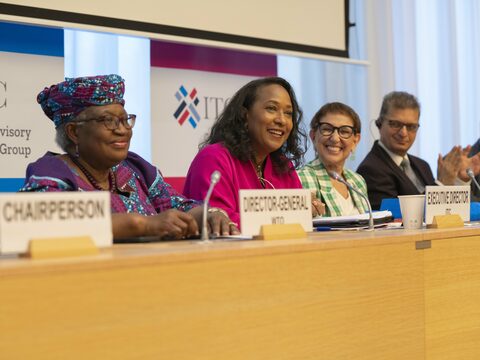
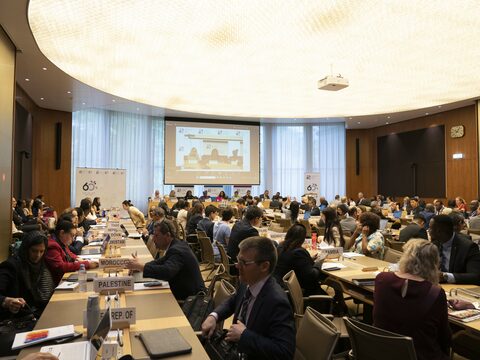
The Joint Advisory Group (JAG) of the International Trade Centre meets annually to examine the activities of ITC based on an ITC Annual Report.




